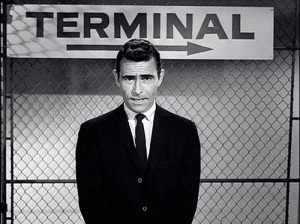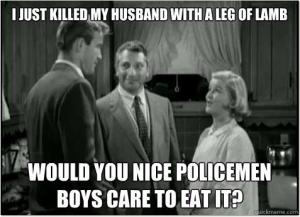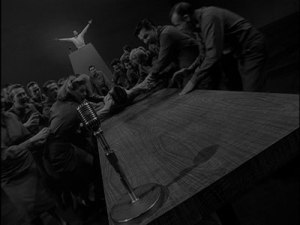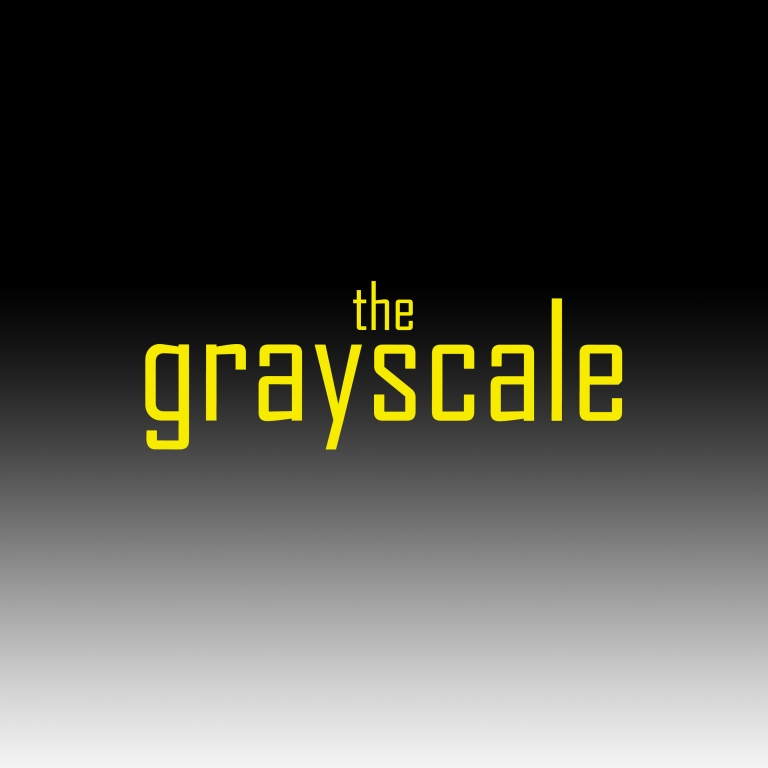
In a short week’s time, The Grayscale will be wrapping up its first season with an episode written by and starring myself, directed by Dylan James Amick, and edited by Chelsea Rugg.
We have been really pleased with the reception you all have given this little radio anthology series that sounds more like past generations and demands focused listening.
The show will be back in the new year with another season of suspenseful, odd, and intriguing tales of the human condition. But until then, I thought that I would help quench your thirst for all things anthology.
What follows is a list of companion episodes to each entry into the first season of The Grayscale. While our shows are original dramatic presentations, we surely took from other anthologies that we love and grew up on, something that I’ve never shied away from in the past.
Note: Almost all of these will be from The Twilight Zone, but not all of them!
If you liked Cracks In The Pavement, then I recommend that you watch The X-Files episode, “Squeeze.”
What are they about?
One is about a man who thinks a monster is making its way from beneath the city, into his apartment to get him! The other is about a monster making it’s way from beneath the city, into people’s houses and offices, to get them!
Why should I watch?
I doubt that Matt had this in mind when he wrote the episode, but as an avid fan of The X-Files, I’m sure he will see the resemblance. The X-Files might not officially be an anthology, but this episode is the first Monster-of-the-week entry, so it feels like it belongs. Though the creature is unnamed in Cracks, it has a lot of the same abilities as Tooms, the man/monster who can squeeze through tight spaces, allowing him entry into almost any place. What makes Tooms interested is his likeness to Man combined with his monstrous abilities. In Cracks, whether the monster is real or not is ambiguous, but it is not so wild to hear the episode as James’s mind being infiltrated with the idea that he is a monster, and picturing all the sounds in his head. After all, Matt voices both James and The Monster. In the end, both of these episodes tackle what happens to a human who suddenly identifies as a monster, and one that doesn’t need much space to operate.
How do I watch it?
Netflix. Season 1, Episode 3
If you liked The Effect of Fog At The Overlook, then I recommend that you watch The Twilight Zone episode “Walking Distance.”
What are they about?
One is about a widower who returns to the spot of his late wife’s first date, and finds himself re-experiencing the past. The other is about a man with a broken down car who accidentally wanders into his hometown in the past, and tries to re-experience a glorious summer.
Why should I watch?
It was my direct inspiration for writing this episode. I talked about this about in my stealing article, so let me steal from that. “I previously had watched the Twilight Zone episode “Walking Distance.” The two episodes, in a sentence, are different stories, but my episode is structured on what I found of value in Rod Serling’s work. In Walking Distance I was struck by the danger of nostalgia being personified by the main character’s newfound limp. Looking into the past can be so dangerous that it will change your life now in ways you can never have back. That previous sentence also boils down to what made Fog interesting to me, yet there are no real scenes or beats that are similar between the two. This is stealing I can get behind.” These are both episodes about the joy of nostalgia, and then the eventual sadness when you realize that you can’t have time back.
How do I watch it?
Netflix. Season 1, Episode 5
OR, SyFy’s annual New Years Twilight Zone Marathon.
If you liked Now, Back To Your Scheduled Programming, then I recommend that you watch the Black Mirror episode, “Be Right Back.”
What are they about?
One is about an engineer who creates a robot that doesn’t fulfill its intended purpose, making her feel terrible. One is about an artist who buys a robot that fulfills its intended purpose, making her feel terrible.
Why should I watch?
Ok, so the tone is completely different, but we are dealing with the same sort of thing, and that is creatures who can’t understand why they are or hate someone else. These are both tragedies, though BRB gets there much quicker. In both cases we have capable women who want to love, and aren’t able to see past any “flaws,” in their partner. For one, it’s the ability to cook better than anyone else, and for the other it’s being too similar to her late husband. More importantly, they are both about humanity, both about people being marginalized, both about people being punished for just being themselves. Black Mirror might be too emotionally taxing for some viewers, but to not let yourself into its murky waters would be a shame, like preventing a robot from its destiny.
How do I watch?
Netflix. Season 2, Episode 1.
If you liked The Last Word On Tragedy, then I recommend that you watch the Alfred Hitchcock Presents episode, “The Mail Order Prophet.”
What are they about?
One is about a struggling journalist who uses a magic person to know the future, and crumbles under his own success. The other is about a struggling stock broker who uses a magic person to know the future, and crumbles under his own success.
Why should I watch?
Besides the things that makes these companions, I will give you three reasons to watch; Hitchcock, Klugman, Marshall. This is like the dream team of anthology series. Hitchcock always allows his nightmarish wit to make us laugh in the openings of this series, and the cosmic wit continues on just like it does in Last Word. In both episodes, the magic plot device allows its hero to benefit just long enough for them to greedy, then it strikes them down with cosmic irony because, well, because they can. The twists at the end couldn’t be more different, but the messages delivered are very similar – Taking the easy way to the top will only bring you all the way down. If you like watching regular hard working people turn into villains, then these are the episodes for you!
How do I watch?
Hulu. Season 3, Episode 2.
If you liked I Thirst, then I recommend that you watch The Twilight Zone episode “The Masks.”
What are they about?
One is about a dying patriarch who sticks it to his terrible family members where it hurts them the most, their pockets. The other is about a dying patriarch who sticks it to his terrible family members where it hurts them most, their pockets…and uh, their faces.
Why should I watch?
Kelly Strauch is a Twilight Zone aficionado, and I know that she had this gem in mind when she penned I Thirst. The fun part of viewing both of these episodes is seeing the same story told both with and without magical influences. It’s hard to finger which one is more terrifying. Spoiler alert, the mutated faces of the terrible family in The Masks are absolutely horrific, but what is perhaps scarier is the idea of someone important having so little faith in you as a person that they create a trap designed for your specific flaws, and you falling right in line with it. The siblings in I Thirst might not have the visual reminders of their faults, but they are one hundred percent convinced by the end that they are terrible selfish people. What’s scarier than that?
How do I watch?
Netflix. Season 5, Episode 25.
If you liked The Best Version Of Myself, then I recommend that you watch The Twilight Zone episode “Mirror image”
What are they about?
One is about a confused man whose life is not improved by the emergence of his doppelgänger. The other is about a confused woman who’s life is not improved by the emergence of her evil doppelgänger.
Why should I watch?
Ok, my description there makes them sound much more similar than they are. They both have a sort of comedic tone for the most part, and they both have a wacky plot. Beyond that, the only thing that links them is the presence of a double. But what a fun presence that is. I think this is one of those “supernatural” things that rational people tend to believe in. MirrorImage was written after Rod Serling saw a man at his airport terminal
wearing the same suit and carrying the same luggage as him. Best Version of Myself was written after I was changing from my regular clothes to my work clothes in a bathroom, and noticed the very big difference in how confident I looked in the two different outfits. Mirrors are truthful, yet reversed, and that’s a super scary idea.
How do I watch?
Netflix. Season 1, Episode 21.

If you liked Jess Dempsey, First Woman on Mars, then I recommend you watch the Night Gallery episode “Silent Snow, Secret Snow”
What are they about?
One is about a secluded woman in space who rejects reality. The other is about a young boy on earth who secludes himself in order to reject reality.
Why should I watch?
Ok, really what we’ve got here is a monster story on Mars, and a young boy who is tantalized by the idea of heaps and heaps of snow that only he can see. These are farther on the horror spectrum. Night Gallery was Rod Serling’s post-Twilight Zone anthology that crept much more into the weird and macabre. Silent Snow, Secret Snow is based on the popular Conrad Aiken short story, and in this iteration is narrated by Orson Welles. It’s hard to watch. The whole story is uncomfortable, and moves slowly towards impending doom. The same could be said about Jess Dempsey. If you enjoy the icky feeling of a hero slowly losing hope, and capped off by unthinkable emotional trauma, then this is right up your alley!
How do I watch?
Hulu. Season 2, Episode 11, Segment 2.
If you liked A Jitter In The Life Of Danny Wampler, then I recommend you watch the Alfred Hitchcock Presents episode “Lamb to the Slaughter”
What are they about?
One is about an angry man who makes people disappear by counting to ten, and then has to evade the consequences. The other is about an emotional woman who makes her husband disappear by way of a lamb hock, and then has to evade the consequences.

Why should I watch?
Our episode is probably more akin to the Twilight Zone stinker The Mind and the Matter, but I’d much rather you watch this other episode. It’s one of the few episodes actually directed by Hitchcock, and is written by Roald Dahl, starring Barbara Bel Geddes. What both of these episodes get right if their sense of humor. They take really horrifying real life events, i.e. killing people, and putting a darkly comedic spin on them. This might be the first and last time that Dylan James Amick is compared to Roald Dahl, but I think they would laugh at the same things. The other great similarity between these episodes is how much tension there is in the silence. Both are loud episodes except for a small window of silence that sticks out like a terrifying sore thumb.
How do I watch?
It’s hard. It’s not included in the Hulu package. But, if you’re not a legal person, you can watch it here
If you liked Penelope Loves You, then I recommend you watch the Twilight Zone episode “It’s A Good Life”
What are they about?
One is about a radio host who controls people with her mind. The other is about a young boy who controls the world with his mind.
Why should I watch?
Because being scared is fun! These are true scary episodes. Both are incredibly ridiculous. Julia Anrather’s voice is so soothing, and lil Anthony Fremont is a freckled faced dweeb, and they both end up as truly benevolent monsters. The goofiness of these episodes is what leads to their most horrific scenes. The fun lets us let down our guard, then we get kicked in the teeth by fear. In Penelope, we hear a man literally cut his own head off without being able to stop it, and in Good Life a drunken party goer tries to distract Anthony long enough to allow someone else to strike him down, only to sacrifice himself for no purpose. Congratulations, now you’re a jack-in-the-box.
How do I watch?
Netflix. Season 3, Episode 8.
If you liked Who Sins Most?, then I recommend you watch The Twilight Zone episode “On Thursday, We Leave For Home”
What are they about?
One is about a priest who gets salvation and hates it. The other is about a Captain who gets salvation and hates it.
Why should I watch?
What great titles, am I right? On Thursday is a hidden gem from the season where TWZ tried to expand to an hour long format. Most of those didn’t work, but On Thursday did. Where both of these episodes succeed is by taking a hard working protagonist who supposedly have the common good of mankind at the forefront of their actions, rewards them for it, and then has them realize that they were just super selfish all along. They follow the same beats, and I particularly like both of their third acts. The realization of their selfishness is what it’s about. Father Lugria realizes his weakness and then immediately launches back into verbal tongue lashing. On the other end, Captain Willard continues on with his normal group meetings, playing the part of everyone in his camp despite the fact that they are gone. These shattered men make these episodes worth watching.
How do I watch?
iTunes. Season 4, Episode 16.
If you like Applaud My Friends, The Comedy is Over, then I recommend you watch the Twilight Zone episode “The Obsolete Man”
What are they about?
One is about the last host of The Tonight Show in a world without laughter, the other is about the last librarian in a world without books.
Why Should I Watch?
I don’t want to give too much away about our last episode, but I can tell you that I wrote it with this episode in mind, and Dylan directed it with this episode in mind as well. The Obsolete Man is required viewing for anyone interested in the anthology. It has social commentary, an action based plot, and a crazy absurd finish. We tried to put all three of those things in Applaud, and I think we really knocked it out of the park. Serling penned this episode as a way to show how easy it would be for a Nazi-like group of oppressors to take power again. My intentions with my script take on a different kind of issue, but again, I will wait for you all to hear it. Listen to it, if only to hear my Grayscale acting debut (minus my uncredited role as the dying father in I Thirst).
How Do I Watch?
Netflix. Season 2, Episode 29.

Thank you again for going on this journey with us. We will be returning next year with more stories of the human struggle, more stories of proceeding with caution, more stories with tough decisions to make.
Join us, on The Grayscale.

WANT MORE FROM CRITICAL POINT THEATRE? OF COURSE YOU DO.
SUBSCRIBE TO OUR PODCASTS ON ITUNES.
VISIT OUR WEBSITE.
DONATE TO OUR WORK.